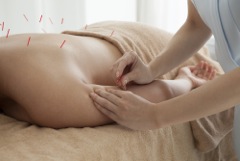 Proponents of acupuncture swear by it and preach its efficacy with a passion usually reserved for religious zealots. Skeptics (usually those with a needle phobia or others not open to “alternative” medicine) aren’t so sure. We ask: What’s the harm in trying? What do you have to lose?
Proponents of acupuncture swear by it and preach its efficacy with a passion usually reserved for religious zealots. Skeptics (usually those with a needle phobia or others not open to “alternative” medicine) aren’t so sure. We ask: What’s the harm in trying? What do you have to lose?
Of course, acupuncture isn’t some new “fad” or “technique,” but rather a traditional Chinese medical application based on the idea that health is governed by the flow of energy (called qi) throughout the body, along pathways called meridians.
Practitioners claim that illness occurs when this energy flow is disrupted or becomes unbalanced.
Precise insertion of acupuncture needles is said to restore the flow of qi and improve health — and if you ask acupuncturists and their clients, the litany of ailments that acupuncture can cure is long.
The Cochrane Library, a highly regarded collection of six databases containing different types of independent evidence to inform healthcare decision-making, finds acupuncture an effective treatment for fibromyalgia, migraine headaches, neck pain and many other conditions.
Naysayers claim it’s nothing more than a placebo, which tricks the body into making itself believe things are better. However, if acupuncture helps facilitate your body’s natural healing ability, then isn’t that what its practitioners claim all along?
As far as the hard science goes, here are seven ways acupuncture could work for you:
-
WEIGHT MANAGEMENT
In 2003, the International Journal of Obesity looked at the body of evidence regarding the use of acupuncture to help lose weight. While the results were mixed, some research found that treatment (specifically, when needling the ear) did help patients lose weight —in conjunction with traditional weight-loss methods, like exercise and a clean diet.
Alternatively, some research found that it was merely the mental effect of acupuncture (more on your mood and needles below) which caused patients to feel better and thus lose weight.
-
SLEEP QUALITY
In a systematized review of 41 trials, acupuncture was shown to relieve insomnia just as effectively as Western medical treatments (a la: Ambien).
-
LOWER BACK PAIN RELIEF
A 2005 study published in Health Technology Assessment confirmed that for all types of non-specific lower-back pain (i.e. not because of a herniated disc or other diagnosable problem), not only did acupuncture relieve just as much pain as traditional primary doctor treatment did in a one-year window, but after two years, acupuncture was a far more effective means of pain reduction.
- POSITIVE IMMUNE REPSONSE
There is a correlation linking acupuncture with heightened production of NK (natural killer) immune cells. This association was especially strong as it relates to cancer, as published in Evidence Based Complementary and Alternative Medicine.
- MIGRAINE PAIN RELIEF
In 2003, research found that acupuncture was just as effective as the well-known prescription drug Imitrex in treating migraines. Additionally, another study that same year confirmed that regular acupuncture was effective in preventing nearly 50 percent of migraines.
-
HEARTBURN RELIEF
If you suffer chronically from esophageal pain, it’s probably worth giving the needles a try. A study published in 2007 confirmed that acupuncture helped improve heartburn more than medicine did on its own, suggesting that the two therapies in tandem work best.
-
ALLERGY RELIEF
A 2013 study published in the journal Annals of Internal Medicine found that acupuncture not only helps with pain, like the lower-back kind, but can also help relieve allergy symptoms such as itching and sneezing. However, like the heartburn research, this was found to be true in groups who were also medicating themselves with antihistamines.
Of course, science can tell you that something is good one day and reverse itself the day after. Thus, the evidence is mixed. Some doctors will dismiss acupuncture completely. Acupuncturists swear by it. Some clinical studies back it up; some doctors do, too.
Not only do many healthcare providers cover the service, but it also has been clinically proven to be non-harmful. Even if the most skeptical scientists say it’s nothing but a placebo, the fact of the matter is the placebo effect — in and of itself — is real.
If acupuncture can help your own body heal itself, without the toxic side effects of drugs or surgery, then it’s certainly worth exploring. As your grandma might say, “Just try it, you may like it.”
